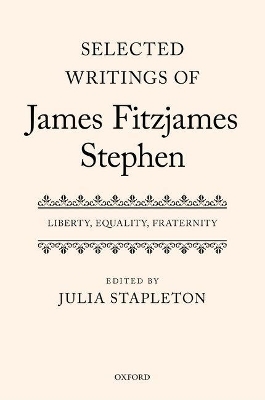
Selected Writings of James Fitzjames Stephen
Liberty, Equality, Fraternity
Seiten
2017
Oxford University Press (Verlag)
978-0-19-921267-5 (ISBN)
Oxford University Press (Verlag)
978-0-19-921267-5 (ISBN)
This is the first critical edition of James Fitzjames Stephen's Liberty, Equality, Fraternity, a systematic attack on J. S. Mill's later social and political thought. It raises significant questions concerning the limits of tolerance, the relationship between liberty and individuality, and between temporal and spiritual power in modern society.
James Fitzjames Stephen was a distinguished jurist, a codifier of the law in England and India, and the judge in the ill-fated Maybrick case; a serious and prolific journalist, a pillar of the Saturday Review and the Pall Mall Gazette. This is the first critical edition of his major work Liberty, Equality, Fraternity, a systematic attack on J. S. Mill's later social and political philosophy. The text originated in a series of twenty letters to the Pall Mall Gazette following Stephen's return from India as the Legal Member of the Viceroy's council in 1872. It was published as a book in 1873 and revised the following year in response to its critics, particularly Frederic Harrison and John Morley. It is the second edition of 1874 that forms the basis of this new edition. Stephen's abrasive style matched his disdain for what he regarded as Mill's enthusiasm for 'abstract' ideals such as liberty and equality--particularly sexual equality. Against Mill's emphasis on freedom of discussion as the most effective means of addressing differences of thought and belief, Stephen argued that conflict could only be resolved by the exercise of force--physical and legal. Rejecting Mill's faith in human improvement through the exercise of reason, he emphasised the importance of revealed religion to morality and to the maintenance of political order. Liberty, Equality, and Fraternity raises significant questions concerning the limits of tolerance, the relationship between liberty to individuality and between temporal and spiritual power in modern society. It was memorably described by Sir Ernest Barker as 'the finest flowering of conservative thought in the latter half of the nineteenth century'. However, the book sought not so much to abandon liberalism as to situate it firmly within the realm of 'experience'.
James Fitzjames Stephen was a distinguished jurist, a codifier of the law in England and India, and the judge in the ill-fated Maybrick case; a serious and prolific journalist, a pillar of the Saturday Review and the Pall Mall Gazette. This is the first critical edition of his major work Liberty, Equality, Fraternity, a systematic attack on J. S. Mill's later social and political philosophy. The text originated in a series of twenty letters to the Pall Mall Gazette following Stephen's return from India as the Legal Member of the Viceroy's council in 1872. It was published as a book in 1873 and revised the following year in response to its critics, particularly Frederic Harrison and John Morley. It is the second edition of 1874 that forms the basis of this new edition. Stephen's abrasive style matched his disdain for what he regarded as Mill's enthusiasm for 'abstract' ideals such as liberty and equality--particularly sexual equality. Against Mill's emphasis on freedom of discussion as the most effective means of addressing differences of thought and belief, Stephen argued that conflict could only be resolved by the exercise of force--physical and legal. Rejecting Mill's faith in human improvement through the exercise of reason, he emphasised the importance of revealed religion to morality and to the maintenance of political order. Liberty, Equality, and Fraternity raises significant questions concerning the limits of tolerance, the relationship between liberty to individuality and between temporal and spiritual power in modern society. It was memorably described by Sir Ernest Barker as 'the finest flowering of conservative thought in the latter half of the nineteenth century'. However, the book sought not so much to abandon liberalism as to situate it firmly within the realm of 'experience'.
Julia Stapleton received her PhD in Intellectual History at the University of Sussex and is a Reader in the School of Government and International Affairs at Durham University. Her research interests lie in British political thought since 1850. She is particularly interested in the narratives of nationhood that informed political discourse in this period and their intersection with religious beliefs and identities. She has written on a range of thinkers and writers, including Ernest Barker, Arthur Bryant, and G. K. Chesterton, paying particular attention to their formation and the different audiences they engaged.
LIBERTY, EQUALITY, FRATERNITY; APPENDIX 1; APPENDIX 2; APPENDIX 3; APPENDIX 4; APPENDIX 5; APPENDIX 6
| Erscheinungsdatum | 12.06.2018 |
|---|---|
| Reihe/Serie | Selected Writings of James Fitzjames Stephen |
| Zusatzinfo | 1 black and white illustration |
| Verlagsort | Oxford |
| Sprache | englisch |
| Maße | 162 x 239 mm |
| Gewicht | 650 g |
| Themenwelt | Literatur ► Biografien / Erfahrungsberichte |
| Literatur ► Essays / Feuilleton | |
| Geschichte ► Allgemeine Geschichte ► Neuzeit (bis 1918) | |
| Geschichte ► Teilgebiete der Geschichte ► Militärgeschichte | |
| Geisteswissenschaften ► Philosophie | |
| Recht / Steuern ► EU / Internationales Recht | |
| Recht / Steuern ► Rechtsgeschichte | |
| ISBN-10 | 0-19-921267-8 / 0199212678 |
| ISBN-13 | 978-0-19-921267-5 / 9780199212675 |
| Zustand | Neuware |
| Haben Sie eine Frage zum Produkt? |
Mehr entdecken
aus dem Bereich
aus dem Bereich
Europa 1848/49 und der Kampf für eine neue Welt
Buch | Hardcover (2023)
DVA (Verlag)
CHF 67,20
Giordano Bruno - ein ketzerisches Leben
Buch | Hardcover (2024)
C.H.Beck (Verlag)
CHF 41,85


